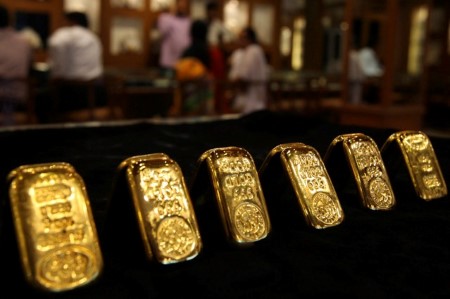




Philippines Trade Update: Imports weaken on tepid demand
 DOWNLOAD
DOWNLOAD

Policy Rate Updates: BSP outlook — cloudy with a chance of rate cut
 DOWNLOAD
DOWNLOAD

January Economic Update: Growth slows, prices rise
 DOWNLOAD
DOWNLOAD


Gold dips as rate hike bets hold despite weak data, dollar gains

April 27 (Reuters) – Gold reversed course and dropped on Thursday, as the dollar gained after weaker US economic readings failed to upend expectations of another interest rate hike by the Federal Reserve next week amid stubborn inflation.
Spot gold was down 0.1% at USD 1,988.08 per ounce by 2:16 p.m. EDT (1816 GMT), while US gold futures settled up 0.2% at USD 1,999.
Data showed the US gross domestic product grew slower-than-expected last quarter, but markets focused on the above-forecast inflation number.
That drove investors to the dollar, making gold more expensive for those holding other currencies. USD/
Although gold is a customary safe haven during economic uncertainties, stubborn inflation could prolong the Fed’s monetary tightening, dimming appeal for zero-yield bullion.
Markets saw an 87% chance of the US Fed raising rates by 25 basis points on May 2-3. Investors now await the core Personal Consumption Expenditures (PCE) index data for March due on Friday.
“If we do get a hotter number on that PCE tomorrow, that’s going to be bearish for gold from a perspective of global demand for the metals markets”, given prospects of further rate hikes, said Jim Wyckoff, senior analyst at Kitco Metals.
Earlier in the day and in previous sessions, gold found support from concerns about the US banking sector, with US government officials so far unwilling to intervene in the First Republic Bank (FRC) rescue process.
Also on the radar were deliberations surrounding the US debt ceiling, lifting Treasury yields.
Although higher interest rates work against gold as it does not provide any yield, they can work in bullion’s favor because they raise the chance of another banking crisis, said independent analyst Ross Norman.
Bullion had scaled more than a year’s peak at USD 2,048.71 in mid-April as the banking crisis unfolded.
Silver rose 0.1% to USD 24.91 an ounce, platinum shed 0.9% to USD 1,079.52 and palladium was down 1.2% at USD 1,494.07.
(Reporting by Deep Vakil and Ashitha Shivaprasad in Bengaluru; Editing by David Goodman, Sohini Goswami, Alexander Smith and Shilpi Majumdar)
This article originally appeared on reuters.com





 By Reuters
By Reuters